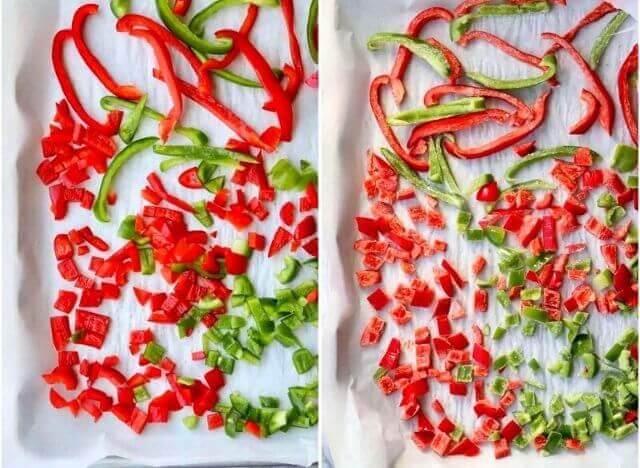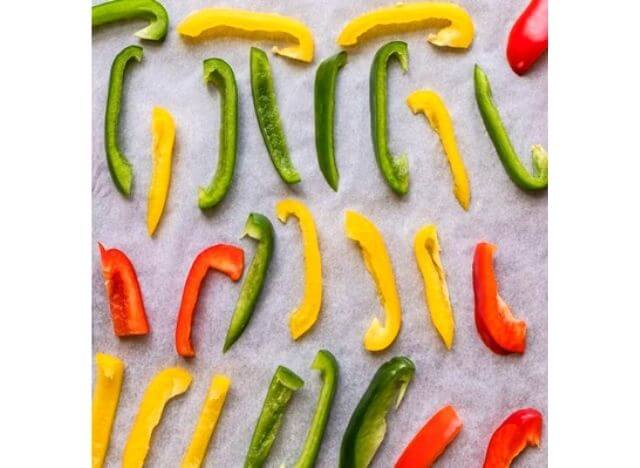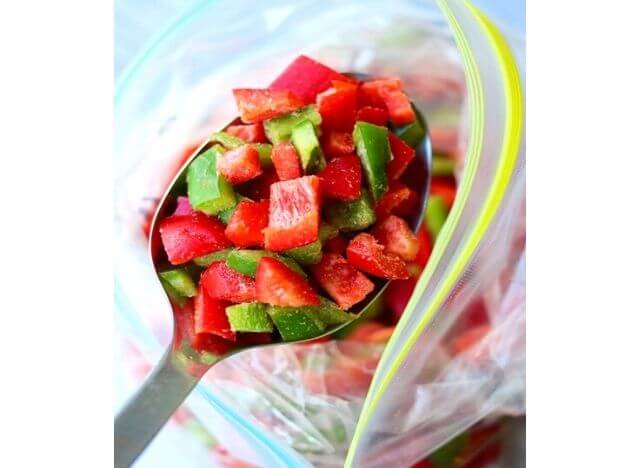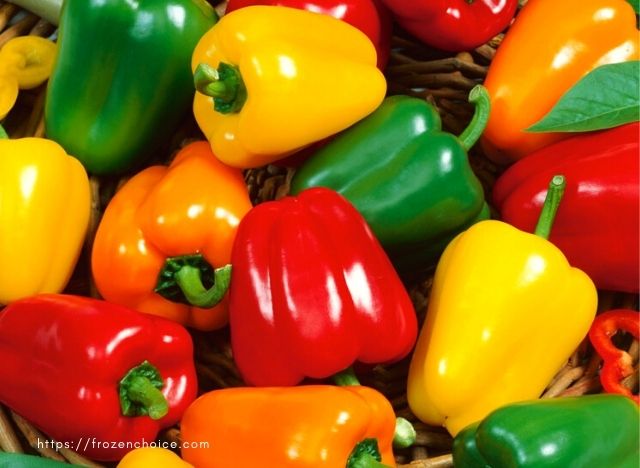If you want a good salad dish that is both healthy and delicious, why not get bell peppers? The question is simple, but sometimes it makes it difficult for homemakers. You can preserve bell peppers for a week or a month. It would be great if I told you, it would be preserved so much longer if we had freezers. So, how long can you freeze bell peppers?
Are bell peppers good for you?
Bell peppers are beneficial to health as they bring many benefits such as:
- Being rich in antioxidants which help to prevent heart disease or cancer. It contains antioxidant vitamins including vitamins C, E and beta-carotene; provides vitamin A and
- Good for weight loss. Bell peppers are low in calorie, but full of nutrients and offer fiber, folate, and iron. They can be mixed to any dishes without adding calories. Besides, they have an amount of capsaicin that supports fat burning.
Red peppers are the most nutritious. Comparing to green peppers, they provide much more beta-carotene and vitamin.

However, peppers contain the alkaloid and solanine. These substances can disrupt nerve function and lead to convulsions and tremors. Besides, they may bring problem for joint health. Therefore, Belly peppers are not good for those who have rheumatoid arthritis, osteoarthritis or people with any joint issues.
Why should you freeze bell peppers after harvest?
Indeed, spring always brings good things to our garden. Bell peppers are an integral part of it. But the number of bell peppers harvested after the crop is so large that we cannot consume them all. There are many ways to eat bell peppers, such as fajitas, soups, salads… or even raw.
Therefore, storing bell peppers will help you avoid food waste and use them longer. It can save you money. The best way to preserve bell peppers for a long time and still retain their flavor is to freeze them. There are quite a few ways to freeze bell peppers so you can choose the best one for you.
How long can you freeze bell peppers?
When there is no freezer
When stored on the counter, whole chilly peppers can last for about 4 to 5 days. They will usually begin to wilt after that.
Cut bell peppers should not be thrown out and refrigerated if not used immediately. The USDA recommends that unrefrigerated cut vegetables be discarded after 2 hours.
Whole bell peppers can be kept for about 1 to 2 weeks if stored properly in the refrigerator. Green peppers are priced slightly better and can be kept for up to 3 weeks.
With a freezer
Freezers are known for extending the lifespan of many foods, and the same goes for some fresh produce. Bell peppers are a vegetable that can be frozen.
Usually, it’s not typical to store bell peppers in the freezer. However, they can be cut before freezing and last in the freezer for about 10 months.
When properly packaged, they can keep in the freezer for up to 12 months.
Bell peppers are versatile and can be preserved in many different ways. A refrigerator is your best option for short-term storage, while a freezer is a safe option for long-term storage.
Further reading : What Are the Best Cheap Freezers for Home?
How to freeze bell peppers properly?
Freezing cut peppers
Bell peppers can be frozen in three simple steps:
First of all, choose the firm, crunchy and soft bell peppers; Wash and cut the peppers the way desired, into long strips or diced.
Next, let the bell peppers freeze for an hour, spread on a tray lined with absorbent paper.
Finally, transfer to a freezer bag and store until you’re ready to use.
Here are the details.
Step 1: Prepare the bell peppers
First, wash the bell peppers thoroughly. Use a sharp knife to cut the flesh from the seeds and stem.
You can slice the peppers into thin strips or dice them depending on what size you want. Cutting into thin strips is excellent for stir-fries and salads, while diced makes the bell pepper omelet look great.

step 2: Freeze first
Bell peppers are fantastic as they can freeze wonderfully while still alive without going through boiling water first.
Gently pat the peppers dry with a paper towel, then place the peppers on a tray lined with absorbent paper and separate the pieces as much as possible. This is very important.
Freezing a portion of chili peppers while they’re separate will prevent you from ending up with a giant chunk of frozen peppers that stick together and are difficult to cook.
Place the tray in the freezer for just an hour. This will start the freezing process.

Step 3: Transfer and Freeze
Last but not least, slow down the critical section, moving into cooler bags or airtight containers. Squeeze out as much air as possible, seal and store in the freezer when you need bell peppers for something.
Freezing whole bell peppers
Whole bell peppers don’t need blanching before freezing. Following is the simple process.
- Cut the tops of bell peppers by a sharp knife. Then, take out the seeds and membranes.
- Place the top back on each pepper and wrap each bell pepper in cling film or plastic wrap, individually.
- Store the bell peppers in a freezer bag and put it in freezer.
Frequently asked questions
How to defrost bell peppers?
Defrosting bell peppers is as easy as freezing them.
Place in the fridge: You can thaw bell peppers by placing them in the refrigerator overnight.
Microwave: You can defrost bell peppers in the microwave. Run the microwave for 20 seconds until they are defrosted.
Drain them: If using a microwave, you may need to drain excess water.
Do bell peppers need to be blanched before freezing?
No, not with peppers. Blanching is considered an essential step before freezing many other types of veggies such as leafy greens, broccoli, string beans, cabbage, okra, and asparagus.
Others don’t need blanching are mushroom, onions, celery, root vegetables, especially potatoes.
Are frozen bell peppers good?
Frozen bell peppers are suitable for cooking later. However, if you want a very crispy chili for your salad, you’re better off using fresh.

My bell peppers wrinkled, can I still eat them?
It’s natural! Bell peppers can begin to wrinkle due to the loss of moisture. They aren’t as appealing and ideal for serving on a vegetable tray with dips because they won’t be crispy. They can be used to cook dishes such as stir-fries or omelets. The pepper flavor may be more robust because the pepper is overcooked.
Reference
1. Freezing Bell Peppers?, Jessica Fisher, Jul. 2021
2. Freeze Peppers the Easy Way, cookathomemom.com, Retrieved on Jan. 12, 2022

